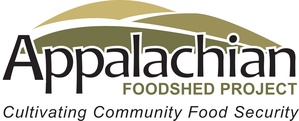The Appalachian Foodshed Project (AFP) is a collaborative partnership for the purpose of enhancing community food security in the central Appalachian regions of West Virginia, southwest Virginia, and western North Carolina.
General About the Organization/Mission
The AFP seeks to address food security from a holistic systems perspective, using a combination of community development and research. Much of the AFP's work to date has involved creating and sustaining strategic partnerships among partner organizations and institutions. Since 2011, this group has hosted three regional multi-state, food system meetings/summits as well as numerous smaller spaces, both face-to-face and digital. The AFP is operated out of three land-grant universities, West Virginia University, Virginia Tech, and North Carolina State University.
Basic Info
| Type of Organization | University/Community Project |
| Website | www.appalachianfoodshedproject.org |
| Primary Contact | Nikki D'Adamo-Damery |
| Social Media |
 |
Issues of focus
The work of the AFP is centered around the concept of community food security. The group has employed the concept as historically defined, such as Hamm and Bellows (2003), as well as in regional contextual manners. The Whole Measures for Community Food Systems (Abi-Nader et al., 2009) have also been used by the project, primarily as a strategic planning tool. These measures, as developed by the original authors include six issues of focus:
- Justice and Fairness
- Strong Communities
- Sustainable Ecosystems
- Thriving Local Economies
- Vibrant Farms
- Healthy People
History of Organization
The Appalachian Foodshed Project was funded by the United State Department of Agriculture's (USDA) National Institute of Food and Agriculture's (NIFA) Agriculture Food and Research Initiative in spring 2011 (Award Number: 2011-68004-30079). Funding concludes at the end of February 2016.
Programs and Projects
Summits and Forums (Regional)
The project has held three regional meetings. In October 2011, a capacity-building forum was held in Blacksburg, VA. This three-state Appalachian gathering (WV, VA, and NC) was followed up by a search conference in March 2012. In May 2013 a third meeting was held to develop approaches for community food security assessments for each state.
Enhancement Grants
The AFP has funded two rounds of small grants to community projects. These funds have supported experimental projects in each state.
Community Food Security Assessments
Each of the three states (WV, VA, and NC) have been in the process of conducting community food security assessments in each state. These assessments have been driven by a partnership between community partners and universities. The assessments in each state differ in scale, scope, and methodology. Each assessment has been designed to meet the needs of each state advisory group. The advisory group in each state is different in both aim and composition.
Systems Dynamic Modelling of Community Food Security
The component of the project involves using a systems dynamic modelling software (in this case STELLA) to model the causal and dynamic relationships between different components of "the" food system. The modelling team has used the Whole Measures for Community Food Systems to structure elements within the model. A final iteration of the model will be completed by the end of the project funding in 2016.
State Advisory Teams
Each state has a different advisory team, with different structures, organization, and aims.
- In West Virginia, the West Virginia Food and Farm Coalition has served in an advisory capacity to the project. The Food Justice Lab and WV FoodLink at West Virginia University have also served as close partners and collaborators.
- In Virginia, the Appalachian Virginia Food Systems Network serves as an advisory and state body with close ties to the AFP.
- In North Carolina, the Western North Carolina Food Security Advisory Council serves as an advisory body.
The project management team, which includes the University-based principal investigators, the deputy director, and the graduate students also includes two community representatives from each state. The team has adopted a governance process, Circle Forward (formerly known as Dynamic Governance) to fairly include the voices of the members of these different teams and organizations.
Partners and Frequent Collaborators
Additional Information
Report: Learnings from the Appalachian Foodshed Project
Central Appalachian Foodshed Conference
Future Developments for This Wiki
- Add partners and frequent collaborators or delete that section
- Rename 'Documents' under additional information
- Add hyperlinks within the text
- need to add info to "profiles of regional partners"--use tags?



